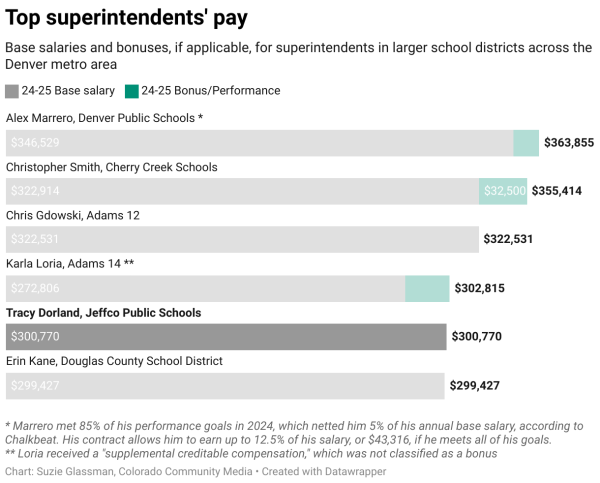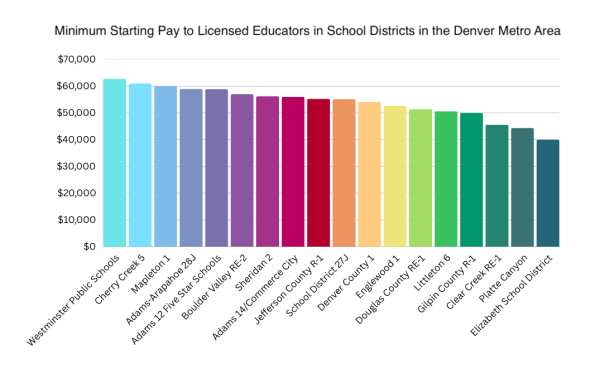Jefferson County Schools Superintendent Tracy Dorland’s request to renegotiate her contract years before its 2027 expiration raises a fundamental question: At a time when the district faces financial instability, declining enrollment, and possible program cuts, should leadership be prioritizing its own compensation over the needs of students and staff?
Dorland’s request isn’t just tone-deaf—it’s a blatant disregard for the financial crisis gripping Jeffco.

A Question of Priorities
Dorland’s 2024–25 salary stands at $300,770, making her the fifth highest-paid superintendent among 18 metro-area districts—excluding benefits like healthcare, retirement, and a car allowance that push her total compensation even higher.
Meanwhile, the compensation disparity becomes even more apparent when comparing the average salary of Colorado teachers—just $63,224—against the national average of $69,597.
Kerrie Dallman, Arvada West Social Studies teacher, Former JCEA President and Former Colorado Education Association President, explains, “She only [reopened her contract] because the Denver superintendent got a significant raise… ‘Let me get my needs met first. Let me empty the coffers now so that there’s less to spread around.’”
Dallman adds, “We love working with kids…but that doesn’t mean we signed up to take a vow of poverty.”
That sentiment is echoed in the numbers. While Dorland cashes in a six-figure salary plus perks, the average Colorado teacher scrapes by on a paycheck barely a fifth of hers. And unlike the superintendent, they don’t get a car allowance—they get second jobs.
Reflecting on her experience working with Dorland, Dallman says, “We were both on the state council for educator effectiveness… I don’t think she’s been a leader when it comes to advocating for professional salaries and working conditions for educators in the district. She’s a brilliant person, but I don’t feel like she’s been very approachable or goal-centered around making us a competitive district.” Dallman continues, “she’ll lose the confidence of educators across the district. And not just teachers, but education support professionals whose paycheck barely covers their contribution to their health insurance.”

This chart reveals a troubling truth: while Jeffco is one of the largest districts in the Denver metro area, it lags behind in starting salaries for teachers—ranking just ninth out of 18. In a profession already battling recruitment and retention challenges, low starting pay sends a message that new educators are undervalued from the moment they enter the classroom.
Given this, Dorland shared that the district would not be able to provide the raises they had hoped for this year. When asked how they plan to retain or incentivize teachers amid these financial constraints, Dorland emphasized that many educators stay in Jeffco because of the district’s “culture” and environment. However, it’s easy to emphasize the importance of culture when you’re the one setting it, and the question still remains: how sustainable is this, when financial incentives seem to be out of reach?
Yes, district executives manage massive budgets and complex policies—a job that warrants higher pay. But even accounting for those responsibilities, the gap is staggering. Teachers face growing workloads and stagnant pay, yet it’s their salaries that get cut, not the superintendent’s.
Dallman goes on, “The benefit of paying a competitive salary is we can attract great teachers here. And we can reduce turnover…One [teacher] in particular said, ‘I can’t afford to teach. I’ve gotta go into the private sector.’ Like, this is all she wanted to do, but she couldn’t afford to live on a teacher’s salary.”
Jeffco is not alone in this dilemma. As districts nationwide face similar budget constraints, it’s often educators who bear the brunt of the financial strain—while administrative salaries remain intact or even increase. Many districts, including Jeffco, have chosen to shield top-level salaries from cuts, despite the financial challenges they face. The limited collective bargaining rights that districts like Jeffco have only make it harder to balance budgets without sacrificing compensation for teachers.
Across the country, educators are feeling the pressure of these financial realities. With over half considering leaving the profession earlier than planned, it’s clear that the growing strain is unsustainable. In fact, the average teacher now earns $2,179 less per year than they did a decade ago, when adjusted for inflation — and that’s while being asked to do more than ever. From covering staffing shortages and managing carpool lines to losing built-in planning periods and taking on expanded mental health support, teachers are doing more with less—and still expected to ensure every student’s safety and success.
The 2023 Voices from the Classroom survey illustrates how unsustainable this situation has become: 87% of teachers agree they have too many responsibilities to be effective, with the report noting, “Their role has expanded infinitely and is no longer sustainable.” In many districts, including Jeffco, teachers are expected to address not only learning gaps but also students’ mental health and trauma. And these expectations come at a time when many educational support professionals earn less than $25,000 per year—well below a livable wage in nearly every state.
Yet administrator pay keeps climbing. The National Education Association (NEA) has called the educator staffing crisis a “five-alarm fire,” warning that unless districts like Jeffco prioritize fair pay and respect for educators, the consequences will be dire for the education system as a whole.
Dallman says, “If we have to pick up more of our health insurance costs, that’s just like saying we’re going to cut your pay.”
And Jeffco is not the only district facing this disconnect between administrative raises and financial strain. Nearby districts, like Aurora Public Schools, approved an unannounced (because who needs public oversight?) five percent bonus for former Superintendent Rico Munn in 2018, amounting to $11,820, while Adams 12 Five Star Schools increased Superintendent Chris Gdowski’s salary by $18,738 in 2023, even as the district faced declining enrollment. In both cases, these increases were far higher than what most teachers earn in a year. Meanwhile, despite a 25% increase in education revenues from 2002 to 2020, inflation-adjusted teacher salaries actually declined by 0.6%, from $64,522 to $64,133. The gap is widening, and the frustration is not just justified—it’s overdue.
The Budget Crisis and Its Consequences
This contract renegotiation does not exist in a vacuum. Colorado is grappling with significant fiscal challenges. According to The Colorado Sun, the state faces a $750 million shortfall—an amount that doesn’t even include an additional $350 million in new law enforcement spending approved by voters through Proposition 130.
Despite the budget strain, Colorado Governor Jared Polis has proposed boosting funding for the state’s new school finance formula by $150 million—$35 million more than his initial recommendation last November, according to Chalkbeat Colorado. Central to his plan is a push to reform how Colorado calculates school funding, specifically how it counts student enrollment.
Colorado funds districts per-student, using a multi-year average to cushion enrollment losses. A proposed change would shorten that averaging period—potentially accelerating funding cuts for districts like Jeffco.
Jeffco knows this reality all too well. As enrollment declines, schools close, and budget shortfalls deepen, the district has closed schools and warned that future cuts will hit classrooms directly. Yet, amid this strain, Dorland’s pay continues to rise. Every dollar added to her compensation is a dollar taken from resources that directly impact students. The superintendent’s rising pay stands in sharp contrast—an executive raise made possible only by taking from an already diminishing pool.
These choices feel stark, especially given Jeffco’s own projected financial shortfall by 2026 and the likelihood of major budget cuts. Educators across the state are expressing concern. Lake County School District Superintendent Kate Bartlett told The Colorado Sun, “Whether you call it the budget stabilization factor or you call it a change to the formula, the mechanism doesn’t matter so much to those of us on the ground…The practical impact is that our funding is reduced.”
And yet, amid this looming financial crisis, Jeffco’s superintendent is seeking a raise. With few remaining areas to cut, the quality of education and student resources now hang in the balance. In fact, this balance was lost long ago. The only thing still untouched? Executive pay.
Justifying Superintendent Salaries in a Struggling District
Amid Jeffco’s ongoing financial strain, justifying a six-figure salary—let alone a raise—for its superintendent becomes increasingly difficult. The district’s budget struggles are not abstract; they have tangible and often painful consequences for both students and educators. Essential programs like journalism, music, and career-technical education, which are frequently operating on minimal budgets, are often the first to face cuts when funding falls short.
In 2022, students at Pomona High School protested cuts to their music program. “I don’t do choir or instrumental music,” freshman Bryn Vaughn said, “but I have a lot of friends that do it, and I’m in journalism, which got cut, and we’re not going to have it next year.” That demonstration underscored how deeply students feel these decisions.
Meanwhile, Superintendent Tracy Dorland’s compensation package exceeds $300,000, including salary and benefits. That disparity becomes even harder to ignore in the context of rising housing costs, making it difficult for teachers to live in the very communities they serve. This doesn’t just hurt morale—it actively jeopardizes the future of the educator workforce. Fewer young people are entering teaching, and educators are leaving earlier than planned, citing burnout, disrespect, and stagnant pay. Without meaningful investment in those on the front lines, the system can’t sustain itself.
Dallman can attest, “When you have teachers in this district, who, let’s say they’re recent graduates, they’re struggling to afford to rent a home or buy a home in the community in which they teach…They’re struggling to figure out how to pay back their student loans.”

The pay gap doesn’t close with experience. Even after years of service and advanced education, Jeffco teachers still hit a compensation ceiling far below neighboring districts. At both the beginning and end of their careers, Jeffco educators are underpaid—and that’s before factoring in inflation, workload increases, and rising living costs.
The role of a superintendent is undeniably important, but effective leadership should involve shared sacrifice and responsible stewardship of resources—not securing personal financial gain in the midst of a budget crisis.
Dallman explains, “The district comes in low. The union comes in high. And the union hopes that we reach a place in the middle that will result in a wage increase that respects the work that we do…The district often hopes that they can get by with offering as little as possible. So that always puts the onus on teachers…to go out and advocate and organize.”
The district’s hesitancy to allocate funds for teachers stands in contrast to its treatment of administrative compensation. In 2024, it took near-midnight bargaining sessions, hundreds of letters, and a mass turnout from the Jeffco Education Association (JCEA) to push the Jeffco School Board into granting teachers a 5% cost-of-living raise and a 2% one-time stipend. Only then did the district reveal it had sufficient reserves to fund those stipends—reserves long considered untouchable. Funny how empty pockets fill when enough people get loud.
Yet, as Dallman points out, the irony doesn’t stop there: “We negotiate for pay increases. We organize around it. We write letters to the board. We call the board. We show up with signs…And other executive leadership at the Ed Center just automatically get whatever we worked hard to get. They don’t have to organize. They don’t negotiate. The district says, ‘you know what? We gave the teachers 2%, [administrators are] gonna get 2% too.’”
In response to concerns about equity in raises aimed at Dorland, Jeffco Public Schools Associate Chief of Communications and Strategic Partnerships, Kimberly Mahugh, stated, “Generally, JCAA (administrators) employees receive an equivalent amount of compensation and benefits increase as JCEA employees (teachers).” But this statement rings hollow. Not only is it vague and unsubstantiated, it ignores the stark realities of disproportionate privilege and decision-making power—where raises for administrators are often quietly approved behind closed doors, while educators protest, petition, and plead for every dollar. Transparency shouldn’t be reserved for bargaining tables—it should apply across the board.
Dorland’s request for higher compensation clashes with the values she helped craft in Jeffco’s Thrives 2025 Strategic Plan, which centers on “belonging,” “equity,” “integrity,” and a “focus on students”—values she seems content to disregard when it benefits her. This roadmap, underpinned by four core priorities—“Our People,” “Our Strength,” “Our Operations,” and “Our Foundation”—emphasizes instructional excellence, fiscal responsibility, and the thoughtful use of resources. If Jeffco is truly committed to deploying resources “strategically to ensure long-term sustainability,” then any increase in executive pay should be subject to the same scrutiny as proposed cuts elsewhere.
A district’s vision is only as credible as the leadership that upholds it. Jeffco cannot brand itself as “a thriving district where all students achieve their biggest dreams” while undermining the very educators and support staff who turn those dreams into reality. Prioritizing “Our People” must extend beyond high-level administrators. When executive salaries are protected while frontline workers face uncertainty, the district’s core values become performative at best.
Ultimately, this issue reveals a deeper inconsistency in how the district approaches financial decisions. When student programs are on the line, the district’s justification is always necessity. When teachers ask for fair pay, the concern is sustainability. But when it comes to top administrators, the narrative shifts: their financial stability is seen as an investment to attract and retain top-talent superintendents. At some point, priorities stop being promises—and become proof.
If ‘Our People’ includes our educators, Dallman agrees that’s not the message being sent to them now. “I think the message is ‘I don’t value you as much as I say I do.’”
If district leaders truly believe in making tough decisions for the future, those decisions should start at the top. Before asking students and teachers to sacrifice, the district must be willing to lead by example. Otherwise, the message is clear: some people in education are valued more than others—and it’s not the ones in the classrooms.
A Leadership Crisis in the Making
Supporters of the renegotiation argue that stable leadership is critical to the district’s long-term success. School Board member Mary Parker defended the ongoing discussions, stating, “We were not prioritizing her contract. I don’t understand where anybody got that impression. Her contract ends in 2027, but superintendents are not on a yearly schedule. There’s no time where you renegotiate or give raises like we have with our unions or with the associations. So it’s not unusual for a superintendent’s contract to be re-evaluated.” Calling this routine doesn’t make it right. It makes it worse. It’s a slap in the face to those whose routines include scrounging for classroom supplies, cleaning up bodily fluids, and working 1000 jobs in one. Standard practice should never be an excuse for sidelining ethical, transparent decision-making.
Dorland’s leadership has undeniably played a role in maintaining a sense of stability in Jeffco, especially navigating the district through the unprecedented challenges following the COVID-19 pandemic. The transition back to normalcy after such a disruption was no small feat, and Dorland’s efforts to keep the district on course are commendable. However, stability must never come at the cost of teachers, students, and the district’s educational future. The long-term success of Jeffco Schools depends not just on leadership but on the well-being of the educators who are on the frontlines every day. If Dorland truly believes in stability, she should lead by example, advocating for better teacher compensation and student resources, and sharing in the sacrifices needed during this crisis. The district can’t thrive if only top leadership is shielded from financial strain.
While not every negotiation can—or should—play out in public, a raise for the superintendent during ongoing budget challenges deserves more scrutiny. If the board truly believes renegotiating Dorland’s contract serves students and educators, why not foster trust by opening the conversation? The secrecy only deepens the perception that district leadership is out of touch with the workforce it depends on.
It bears repeating: the superintendent is a public servant, not a sovereign. Her mandate is to support the educators and students of this district—not to be insulated from them. While the role is complex and high-stakes, it is also transient. Superintendents come and go. The average teacher, however, remains in the district far longer, and students live with the consequences of leadership decisions long after those leaders have moved on. The truth is simple: Jeffco can—and will—operate without a particular superintendent. It cannot function without teachers in classrooms and students in seats.

The Real Test of Leadership
True leadership isn’t about securing a more lucrative contract—it’s about making difficult choices in service of the community. If Dorland truly believes in the importance of stability, she should lead by example: delay any contract renegotiation and instead advocate for increased teacher salaries and student resources.
With educator contract negotiations set for this spring, Jeffco teachers will soon be at the bargaining table. Will they be met with the same financial flexibility that the board seems willing to extend to the superintendent? Or will they once again be told to tighten their belts for the sake of the district’s financial future?
At the end of the day, this debate is about more than just one salary—it’s about trust, priorities, and the kind of leadership Jeffco families and educators deserve. The board must decide: does it stand with the people who make learning possible, or with those who simply oversee it?



Bee • Apr 30, 2025 at 9:10 pm
This article is both astoundingly astute and articulate. I’m in awe of the writing ability and further in support of the honest and relevant questions raised about the issue at hand (i.e., Dorland’s request). Phenomenal work, Co-Editors. Really, truly. You should be proud of this.
Leslie Van Doren • Apr 17, 2025 at 10:31 am
If there is any compensation increase. it should go to teachers they should be the priority!!!
Or should go towards the children they are a priority also!!!!